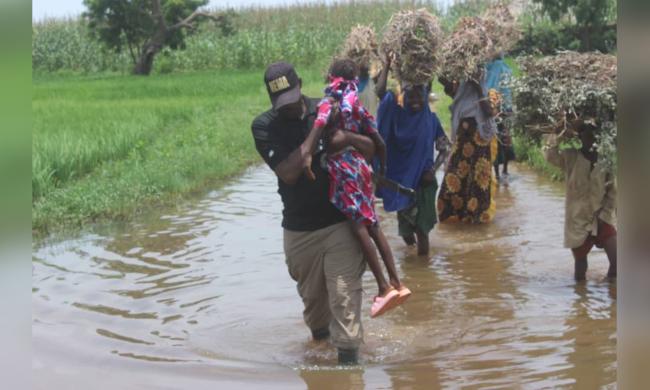
The National Emergency Management Agency (NEMA) has reported that devastating floods have claimed 179 lives and displaced 208,655 individuals across 22 states in Nigeria this year. These figures were revealed in NEMA’s 2024 Flood Updates, published on Wednesday.
The report underscores the extensive destruction caused by the floods, which have ravaged 107,652 hectares of farmland and destroyed 80,049 homes. The northern states have been hit the hardest, with the flooding primarily attributed to unusually heavy rainfall and rising water levels in the Niger and Benue rivers.
NEMA’s update also noted that the flooding impacted 137 local government areas across 28 states. Among the states most affected by recent disasters are Bauchi with 86,000 people affected, Zamfara with 75,000, Sokoto with 74,000, and Jigawa with 57,000. Other states such as Niger, Kano, Imo, Adamawa, Ondo, Borno, and Taraba have also reported significant numbers of affected residents.
In terms of fatalities, Jigawa recorded the highest number with 34 deaths, followed by Bayelsa and Kano, each with 25. Other states like Bauchi, Taraba, Zamfara, Sokoto, Yobe, Adamawa, Katsina, and Niger also reported casualties ranging from 23 to 1.
Sokoto State reported the highest number of displaced persons at 41,000, followed by Bauchi with 35,000, Zamfara with 32,000, and Niger with 28,000. Several other states, including Jigawa, Imo, Taraba, Borno, and Bayelsa, also reported significant displacement.
The report further detailed the extensive damage to farmland, with Bauchi being the worst hit, losing 50,000 hectares, followed by Taraba with 21,000 hectares, and Jigawa with 10,000 hectares. Sokoto and Niger also experienced substantial losses, each losing 9,000 hectares of farmland.
In terms of housing destruction, Bauchi again topped the list with 18,000 homes destroyed, followed by Sokoto with 10,000, and Jigawa with 8,000. Other states such as Niger, Enugu, Borno, Zamfara, Kwara, Kano, Yobe, and Katsina also suffered significant damage to housing infrastructure.
NEMA Director-General Zubaida Umar highlighted the agency’s extensive disaster assessments across nearly all states but pointed out that funding remains a significant challenge. The Chief of Staff to the President, Femi Gbajabiamila, has proposed creating legislation to ensure that states contribute counterpart funds to support NEMA’s operations. He emphasized the need for innovative funding solutions to address the current financial constraints.
President Bola Ahmed Tinubu expressed condolences to the flood victims and pledged continued support for affected families. He stressed the importance of environmental resilience and the need for timely warnings to mitigate the impact of such disasters.
NEMA has warned that the flooding situation could worsen in September and October, with spokesperson Manzo Ezekiel indicating that the northern states might face even more severe conditions.
Meanwhile, over 41,000 people remain displaced, and the damage to farmland could have significant implications for food security. Agriculture and Food Security Minister Abubakar Kyari has cautioned that this year’s harvests could be negatively impacted, potentially affecting farmers’ livelihoods. He also reaffirmed the government’s commitment to investing in technologies to help farmers adapt to climate change and reduce future risks, while also enhancing dry-season farming to boost food production.
For more updates, join our WhatsApp channel here.